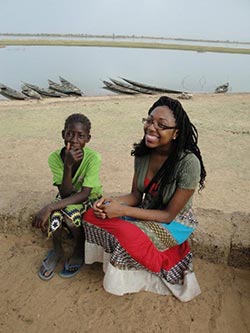World-Class Students
Five UMBC students have been awarded Fulbright grants, and two additional students have been named alternates for the prestigious program that takes students around the world to teach English or conduct original research. This ties last years number, which set a record for the most UMBC students to receive the award in one year.
Four students were awarded English teaching assistantships: Yasmin Radbod 13, Asian studies, for Nepal; Alexandra Mills 13, gender and womens studies, for Malaysia; Hannah Kurlansky 13, English and media and communication studies, for Slovakia; and Andrew Holter 12, English and history, for the Czech Republic. In addition, Madeline Hall 12, environmental studies, received a grant to conduct research in New Zealand.
The Fulbright Program is the flagship international educational exchange program sponsored by the U.S. government and is designed to increase mutual understanding between the people of the United States and the people of other countries. The Program operates in over 155 countries worldwide.
Holter said that when he learned he had received the award, he was both thrilled and humbled by the offer. It was excitement paired with a really unexpected and satisfying sense of responsibility, since the Department of State doesn’t just hand these out so that 23-year-olds can take vacations, he said.
Two additional students were named alternates for the awards, Abigail Bratcher 13, history and Russian, for research in Russia and Nathan Rehr 13, political science, for an English Teaching Assistantship in Turkey.
I could not be happier for or more proud of our Fulbright recipients and alternates, and am thrilled that UMBC’s talented students are being recognized by the U.S. Student Fulbright Program, said Brian Souders, the associate director of international education services. It is rewarding to see that our students are recognized internationally for the work they do.
I have always been interested in exploring and learning from other cultures. I believe that no one person, nation, or group of people has a monopoly on knowledge, said Mills, who plans to attend graduate school in public policy after she returns from abroad.
Recipients of Fulbright grants are selected on the basis of academic or professional achievement, as well as demonstrated leadership potential in their fields. At UMBC, the process of applying for a Fulbright starts six to eight months prior to the October application deadline. Students develop ideas for a research or service project, write essays and gather letters of support from UMBC faculty members and research mentors overseas. They receive advice from academic mentors and Souders along the way. Applicants also have an on-campus interview that is geared to help strengthen their final proposals prior to submission.
This year’s cohort of applicants brought a unique set of academic interests, creativity and endurance to get through the Fulbright application process, said Souders. Almost all had participated in a semester-length study abroad program, and many wanted to continue research they started overseas, or give back as a teacher of English and cultural ambassador.
Radbod, for example, has worked extensively with refugee populations in Baltimore, some of which are Nepalese immigrants. She also spent a year studying abroad in China.
Students courses of studies and extracurricular activities on campus also contribute to the strength of their Fulbright applications.
At UMBC I’ve been able to study language and communication in depth, which should help me in teaching English abroad. I’ve learned what can be accomplished when students work together and I’m excited to see how this translates for me with this experience, said Kurlanski.
If Bratcher and Rher do not receive grants this year, they will be encouraged to reapply. One of this years awardees, Madeline Hall, was selected as an alternate last year but awarded a grant this year after tweaking her research proposal.
I will be researching how sheep and cattle farmers in New Zealand decide whether or not to take part in carbon capture programs, said Hall. Carbon capture is still a very new field. Since New Zealand is ahead of the curve, its a really great place to get experience that I could potentially use elsewhere.
(5/30/13)

